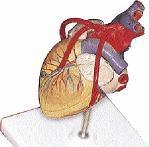
Post-heart-attack diet
After a heart attack, adopting either a low-fat or Mediterranean-style diet significantly benefits overall and cardiovascular health, research suggests.
The diets provide similar amounts of protein, carbohydrates, cholesterol and unhealthy saturated fats, but a Mediterranean diet has higher amounts of 'healthy' monounsaturated fats, particularly omega-3 fatty acids found in fish.
Either diet, when applied with equal intensity, can be an effective component of post-heart-attack lifestyle changes, researchers say.
Post-heart-attack patients who followed these diets for four years significantly reduced their risk for subsequent cardiovascular events, Dr Katherine R. Tuttle and colleagues found. Compared with first heart-attack patients receiving usual care, the risk for subsequent death or cardiovascular events, "was about 70 per cent lower in dietary intervention participants", Tuttle told Reuters Health. The findings are published in The American Journal of Cardiology.
50 recruits
Tuttle, of Sacred Heart Medical Center and the University of Washington School of Medicine in Spokane, Washington, and colleagues recruited 50 patients to actively follow the American Heart Association Step II diet (low-fat), and 51 to follow a Mediterranean-style diet. The men and women, who had suffered their first heart attack within six weeks of enrolling in the study, received individual and group dietary counselling for up to 24 months. They were also encouraged to exercise, lose weight and stop smoking, if needed.
After four years, the researchers found that eight individuals in each dietary intervention group had either a second heart attack, unstable angina (chest pain on exertion) or stroke. None had died. When Tuttle's team assessed a similar group of 101 first-heart-attack patients who did not participate in the study but received usual care, they found 33 with subsequent heart attack, heart failure, unstable angina or stroke, and seven deaths (three heart-related). These findings, though from a modestly sized study population, reflect 'real-world' experience as participants bought and prepared their own foods, the researchers note.
Sources: Copley News, The American Journal of Cardiology, June 2008 & Reuters Health.

